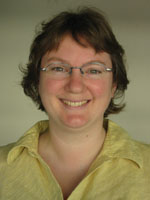
Juana I. Rudati
State University of New York at Stony Brook
Raising the Next Generation
Starting a new career is similar to joining a game late without knowing the rules, when players already know each other’s strategies and beliefs. They are wary of outsiders but understand that the only way of adding zest is to bring in new competitors.
Graduate students’ sources of contacts often are their thesis advisers’ colleagues and collaborators. In my later years as a graduate student I realized I would not have the luxury of my adviser’s introductions forever and that I needed to create my own network. But the question was how to go about doing it.
It is not easy for young scientists to get to know more advanced scientists who might have a say in who gets important grants or which results get published. Attending major meetings exposes young scientists to hundreds, maybe thousands, of more experienced scientists, but only quick conversations can be achieved there. Most attendees are busy preparing talks, interviewing future colleagues, or discussing results. Opportunities for undisturbed chats are few and far between. Meals are natural opportunities for relaxed conversation; large meetings, however, cannot possibly accommodate everyone with meals, so attendees go their separate ways–with their “usual crowds.”
This is where Gordon Conferences make a big difference. Because the number of attendees is limited, it is possible to get to know everyone. Meals are included as part of the conference and are scheduled in a cafeteria filled with large round tables. It forces conferees to reach beyond their comfort zones and explore new relationships. In turn, those relationships can provide new links in a scientist’s network as well as future research collaborators. There are few people I work with today that I did not meet at a Gordon Conference.
Gordon Conferences are scheduled to provide plenty of time for stress-free exploratory conversation and unrestricted activities. The conferences I have attended have provided time to go canoeing or to ponder research questions with fellow graduate students, scientists, or professors who are tired of working on grant applications. During those unrestrained discussions no research idea is too crazy. Free time is also an opportunity for career advancement. Going for an organized hike with a prospective postdoc adviser can act as a sneak preview of the dynamics of such a relationship. People looking for postdocs and junior faculty can get more thorough impressions of candidates. Activities also bring renewed energy necessary for the evening talks.
Gordon Conferences run only one session at a time, which has allowed me to talk comfortably with many authors of papers I have read. There was no need to cut conversation short to go to another session or to sacrifice attending a talk in order to continue conversation.
Most important, Gordon Conferences help to build camaraderie. The same crowd shows up at every meeting, with a few new people each time to add spice to the conversation by bringing new perspectives to ongoing discussions and new research results for analysis. Furthermore, GRC provides an opportunity to talk not only to professors but also to their students who work on experiments day in and day out.
I have felt welcome since the first Gordon Conference I attended. I applaud the organization for maintaining the perfect combination of conference features that make the experience a success for both long-time attendees and new generations.